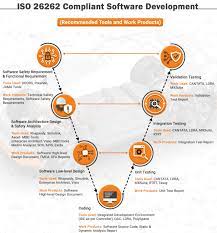Enhancing Quality and Compliance: The Significance of ISO Software Development
ISO Software Development: Ensuring Quality and Compliance
ISO software development refers to the process of developing software in compliance with the standards set by the International Organization for Standardization (ISO). These standards are designed to ensure that software products are of high quality, reliable, and meet customer requirements.
Benefits of ISO Software Development
Adopting ISO standards in software development offers several benefits:
- Quality Assurance: ISO standards help in establishing processes that ensure consistent quality throughout the software development lifecycle.
- Risk Management: By following ISO guidelines, developers can identify and mitigate risks early in the development process.
- Customer Satisfaction: ISO-compliant software is more likely to meet customer expectations and requirements, leading to higher satisfaction levels.
- Compliance: Adhering to ISO standards helps companies comply with legal and regulatory requirements related to software development.
Key Principles of ISO Software Development
The key principles of ISO software development include:
- Customer Focus: Understanding and meeting customer needs is a primary focus throughout the development process.
- Leadership: Effective leadership ensures that the team is aligned with organizational goals and quality objectives.
- Process Approach: Adopting a systematic approach to software development leads to more consistent results.
- Continuous Improvement: Regularly reviewing processes and making improvements is essential for achieving excellence in software development.
Implementing ISO Standards in Software Development
To implement ISO standards effectively, organizations should:
- Educate Team Members: Provide training on ISO standards and their application in software development.
- Create Documentation: Document processes, procedures, and quality objectives to ensure consistency and traceability.
- Audit Processes: Regularly audit software development processes to identify areas for improvement and ensure compliance with ISO standards.
Top 8 FAQs About ISO Software Development: Importance, Benefits, and Implementation
- What is ISO software development?
- Why is ISO software development important?
- How does ISO software development ensure quality?
- What are the benefits of following ISO standards in software development?
- What are the key principles of ISO software development?
- How can organizations implement ISO standards in software development effectively?
- Are there specific ISO standards dedicated to software development?
- How does ISO certification benefit companies involved in software development?
What is ISO software development?
ISO software development refers to the approach of developing software in accordance with the standards established by the International Organization for Standardization (ISO). These standards are designed to ensure that software products are developed using consistent processes, adhere to quality guidelines, and meet customer requirements effectively. By following ISO guidelines in software development, organizations can enhance the quality, reliability, and compliance of their software products, ultimately leading to improved customer satisfaction and operational efficiency.
Why is ISO software development important?
ISO software development is important for several reasons. Firstly, adhering to ISO standards ensures that software products are developed using best practices, leading to higher quality and reliability. By following established guidelines, organizations can minimize errors, reduce risks, and enhance customer satisfaction. ISO software development also helps companies comply with regulatory requirements and industry standards, demonstrating a commitment to quality and excellence in software development processes. Overall, embracing ISO standards in software development is crucial for achieving consistent results, meeting customer expectations, and driving continuous improvement in the development lifecycle.
How does ISO software development ensure quality?
ISO software development ensures quality by establishing a set of standardized processes and guidelines that focus on quality assurance at every stage of the software development lifecycle. By following these ISO standards, software developers can implement best practices for requirements gathering, design, coding, testing, and maintenance. This structured approach helps in identifying and addressing potential issues early on, leading to higher-quality software products that meet customer expectations. Additionally, ISO software development emphasizes continuous improvement and regular monitoring of processes to ensure that quality standards are consistently met throughout the development process.
What are the benefits of following ISO standards in software development?
Following ISO standards in software development offers numerous benefits. Firstly, adherence to ISO standards ensures that software products are of high quality, reliable, and meet customer requirements consistently. This leads to increased customer satisfaction and trust in the software being developed. Additionally, following ISO standards helps in effective risk management by identifying and mitigating risks early in the development process. Compliance with ISO guidelines also aids organizations in meeting legal and regulatory requirements related to software development, thereby reducing potential legal issues. Overall, embracing ISO standards in software development results in improved quality assurance, enhanced risk management practices, and greater customer satisfaction.
What are the key principles of ISO software development?
The key principles of ISO software development encompass fundamental aspects that guide the process towards quality and compliance. These principles include customer focus, emphasizing the importance of understanding and meeting customer needs throughout the development cycle. Leadership plays a crucial role in aligning teams with organizational goals and quality objectives. Adopting a process approach ensures systematic and consistent software development results, while continuous improvement involves regular reviews to enhance processes and achieve excellence in software development. By adhering to these key principles, organizations can establish a solid foundation for successful ISO-compliant software development practices.
How can organizations implement ISO standards in software development effectively?
Organizations can effectively implement ISO standards in software development by following a structured approach that involves educating team members, creating comprehensive documentation, conducting regular process audits, and fostering a culture of continuous improvement. Training employees on ISO standards and their relevance to software development is crucial to ensure understanding and compliance. Documenting processes, procedures, and quality objectives helps establish consistency and traceability in the development lifecycle. Regular audits of software development processes enable organizations to identify areas for enhancement and ensure adherence to ISO standards. Embracing a culture of continuous improvement encourages teams to seek ways to optimize processes and deliver high-quality software products that meet ISO requirements.
Are there specific ISO standards dedicated to software development?
Yes, there are specific ISO standards dedicated to software development. One of the most well-known standards in this area is ISO/IEC 12207, which provides guidelines for software life cycle processes. This standard covers various aspects of software development, including planning, implementation, testing, maintenance, and documentation. Additionally, ISO/IEC 25010 focuses on quality characteristics and metrics for software products and systems. These standards help organizations establish best practices and ensure that their software development processes meet international quality and compliance requirements.
How does ISO certification benefit companies involved in software development?
ISO certification benefits companies involved in software development by providing a framework for ensuring quality, consistency, and customer satisfaction throughout the development process. By adhering to ISO standards, companies can enhance their credibility, demonstrate their commitment to quality management, and gain a competitive edge in the market. ISO certification also helps companies streamline their processes, identify areas for improvement, and comply with regulatory requirements. Overall, ISO certification in software development not only enhances the company’s reputation but also leads to increased efficiency and customer trust.




